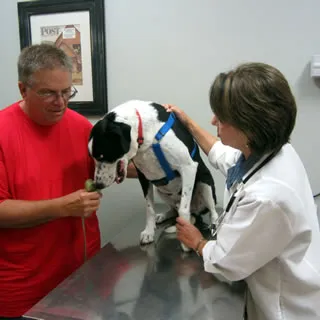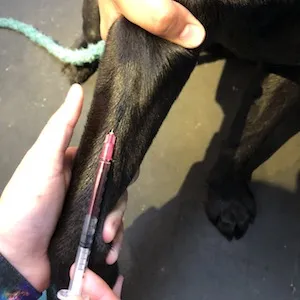Welcoming a new puppy into your home is an exciting time, filled with joy and new responsibilities. Among the most crucial aspects of their early care is protecting them from heartworm disease, a serious and potentially fatal condition. Understanding heartworm disease, how it’s transmitted, and the importance of timely Heartworm Medicine For Puppies is vital for ensuring your furry friend lives a long, healthy life. This guide will provide you with essential information on preventing and managing heartworm in young dogs, focusing on effective preventative measures and the role of veterinary care.
Understanding Heartworm Disease in Puppies
Heartworm disease is caused by foot-long worms (heartworms) that reside in the heart, lungs, and associated blood vessels of affected pets, leading to severe lung disease, heart failure, and damage to other vital organs. While dogs are natural hosts, meaning the worms mature, mate, and reproduce within them, puppies are particularly vulnerable. Without proper prevention and timely heartworm medicine for puppies, their numbers can escalate rapidly, potentially reaching hundreds of worms in severe cases. This disease inflicts lasting damage to the heart, lungs, and arteries, significantly impacting a dog’s long-term health and quality of life.
How Heartworm is Transmitted
The transmission of heartworm disease is solely dependent on mosquitoes. Adult female heartworms living in an infected animal (like a dog, fox, or coyote) produce microscopic baby worms called microfilariae, which circulate in the bloodstream. When a mosquito bites an infected animal, it ingests these microfilariae. Over 10 to 14 days, these baby worms develop into “infective stage” larvae within the mosquito. When this infected mosquito then bites a puppy or another susceptible animal, the infective larvae are deposited onto the skin and enter the new host through the bite wound. It takes approximately six months for these larvae to mature into sexually active adult heartworms. Due to the longevity of these worms, continuous exposure to mosquitoes can lead to an increasing worm burden in an unprotected puppy.
Signs of Heartworm Disease in Young Dogs
In the early stages, puppies with heartworm disease may show few or no symptoms. However, as the infection progresses and the worms grow, clinical signs become more apparent. Active puppies, those with heavy infections, or those with other underlying health issues may exhibit more pronounced symptoms. Watch out for a mild, persistent cough, a reluctance to exercise, fatigue after moderate activity, decreased appetite, and weight loss. heartworm meds for dogs are crucial for prevention and early treatment to avoid severe progression. In advanced stages, puppies can develop heart failure, marked by a swollen belly due to fluid accumulation. A life-threatening condition called caval syndrome can occur with large numbers of heartworms, leading to sudden cardiovascular collapse, labored breathing, pale gums, and dark, coffee-colored urine. Prompt veterinary intervention, often surgical, is critical for survival in such cases.
The Importance of Heartworm Medicine for Puppies
Preventing heartworm disease in puppies is significantly easier, safer, and less expensive than treating an established infection. The American Heartworm Society strongly recommends a “think 12” approach: testing your pet every 12 months for heartworm and administering heartworm preventive medication 12 months a year. This year-round prevention is vital, regardless of your geographic location, as heartworms have been diagnosed in all 50 states, and mosquitoes can thrive in various climates and even indoors.
Starting Heartworm Prevention Early
Puppies are just as susceptible to heartworm disease as adult dogs, if not more so due to their developing immune systems. It is recommended that puppies begin heartworm prevention as early as the product label allows, typically no later than 8 weeks of age. Since the dosage of heartworm medicine for puppies is based on body weight, not age, and puppies grow rapidly, it’s essential to consult your veterinarian frequently to ensure your puppy receives the correct dosage. Regular weigh-ins during well-puppy exams are crucial to stay on top of their preventative care.
 Veterinarian examining a puppy, emphasizing preventative care
Veterinarian examining a puppy, emphasizing preventative care
Types of Heartworm Medicine for Puppies
Heartworm preventives work by eliminating the immature (larval) stages of the heartworm parasite. These medications target the infective larvae deposited by mosquitoes and the subsequent larval stage that develops inside the animal. It’s critical to administer heartworm medicine for puppies strictly on schedule (monthly for oral/topical products or every 6-12 months for injectables) because larvae can molt into an immature adult stage in as little as 51 days, which preventives cannot effectively eliminate.
Heartworm preventives are available in various forms:
- Oral Chewables: Often flavored, making them easy to administer monthly.
- Topical Spot-Ons: Applied to the skin, typically on the back of the neck, once a month.
- Injectables: Long-acting injections administered by a veterinarian, providing 6 or 12 months of protection (for dogs 6 months or older).
Many heartworm preventives offer additional protection against other parasites, such as hookworms, roundworms, whipworms, and even external parasites like fleas and ticks. Your veterinarian can help you choose the best comprehensive parasite control product for your puppy’s specific needs and risk factors. Choosing the right medicine for ticks and fleas in dogs alongside heartworm prevention ensures broad protection. For instance, some may also provide discount flea and tick medicine for dogs benefits.
Heartworm Testing for Puppies
Early detection of heartworm disease improves the chances of recovery significantly. While very young puppies (under 7 months) can typically start prevention without a test, it is crucial that they are tested 6 months after the initial visit, again 6 months later, and then annually. This staggered testing schedule accounts for the approximate 6-month period it takes for a dog to test positive after infection. For adult dogs (over 7 months) not previously on prevention, testing is mandatory before starting any heartworm medicine. Annual testing is essential, even for puppies on year-round prevention, to confirm the program’s effectiveness, as no preventive is 100% effective. A simple blood test performed by your veterinarian can detect heartworm proteins quickly.
 Close-up of a dog's blood sample being prepared for analysis
Close-up of a dog's blood sample being prepared for analysis
What if Your Puppy Tests Positive?
While no one wants a positive heartworm diagnosis, most infected dogs, including puppies, can be successfully treated. The treatment aims to stabilize your puppy, if necessary, and then eliminate all adult and immature worms while minimizing side effects.
Key steps if your puppy tests positive:
- Confirm the Diagnosis: Due to the complexity and cost of treatment, a positive antigen test should always be confirmed with an additional, different test.
- Restrict Exercise: Physical exertion increases the rate at which heartworms damage the heart and lungs. Strict exercise restriction is paramount.
- Stabilize Health: Before treatment begins, your puppy’s condition may need to be stabilized, especially in severe cases. This can take several months.
- Administer Treatment: The American Heartworm Society provides guidelines for treatment protocols, which typically involve a series of melarsomine injections administered in a veterinary hospital. This medication effectively kills adult worms. Other medications, including heartworm preventives (to prevent new infections and eliminate microfilariae), may also be part of the protocol.
- Post-Treatment Testing and Prevention: Approximately 9 months after treatment, a heartworm test will confirm the elimination of all worms. To prevent reinfection, continuous year-round heartworm prevention is critical for the rest of your puppy’s life.
Conclusion
Protecting your puppy from heartworm disease is a year-round commitment that involves consistent preventative care. Understanding the risks, adhering to a strict schedule for heartworm medicine for puppies, and maintaining regular veterinary check-ups and testing are the cornerstones of this protection. Early prevention is not only the most effective strategy but also safeguards your puppy from a potentially devastating disease, ensuring they can enjoy a healthy and active life by your side. Always consult your veterinarian to establish the best heartworm prevention and treatment plan tailored to your puppy’s individual needs.
